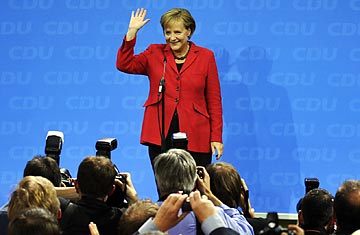
German Chancellor Angela Merkel in Berlin after the parliamentary elections on Sept. 27, 2009
"Tonight we can celebrate, but after that there is much work waiting for us, and many problems to solve." That sentiment is a reliable standard for victorious politicians seeking to temper triumphalist election-night speeches with a little humility. But as Chancellor Angela Merkel acknowledged her party's win in parliamentary elections in Germany on Sept. 27, she had especially good reason to caution against overexuberance. Her Christian Democrats (CDU/CSU) had secured another four-year term as the senior partner in a ruling coalition. And thanks to big gains by the center-right Free Democrats (FDP), who espouse economic liberalism and have a tradition of close ties to Washington, Merkel and her colleagues should be able to shed their existing coalition partner, the Social Democrats (SPD), for what is a more natural political ally. Yet the Christian Democrats did so with a lower percentage of votes than at the last election in 2005, despite Merkel's personal popularity, which transcends party allegiances.
There is certainly work waiting. One of Merkel's greatest achievements in her first term was to hold together a grand coalition with her rivals and natural ideological opponents, the SPD. She did so through compromise and caution. As the world weathered economic storms and rapid social change, the German government responded slowly and carefully.
Her new allies are likely to inspire more ambitious change. Top of the pile of unfinished business: nurturing and revitalizing a torpid economy, the world's fourth largest. Under the influence of her SPD partners, Merkel intervened to preserve jobs in big industries. Guido Westerwelle, the FDP's leader, and future deputy to Merkel in the new coalition, believes too little has been done to look after the interests of Germany's Mittelstand, its small- and medium-size businesses. He told TIME in a recent interview that some German stimulus measures had been ill-conceived. "You can sign 100 stimulus programs but if investing doesn't gain momentum, the economy won't get better," he said.
In Merkel's victory speech, she emphasized her intention to be a "Chancellor to all Germans." If she meant this as a warning that she intends to resist her new partner's tax-cutting agenda, Westerwelle won't be happy. The final shape of the new government won't emerge until after a period of horse-trading and a vote in the Bundestag, probably in a week or two, to confirm Merkel as Chancellor. Westerwelle, despite his focus on economics, is expected to become Foreign Minister, the traditional role for the leader of the junior coalition party. The biggest foreign policy issue confronting the incoming government is Afghanistan. Germans are increasingly unhappy with their troops' participation in the NATO mission there, but the U.S. and other countries are keen to see Germany shoulder more of the burden.
Westerwelle, like Merkel, looked for a sober tone as he addressed supporters. "We are ready to accept the responsibility," he said. Frank-Walter Steinmeier, the defeated SPD leader, sounded abject: "The voters have spoken. It's a bitter day for Germany's Social Democrats. It's a bitter result for us."
That's undoubtedly true. The SPD was squeezed not by its opponents on the right but by the hard-left party Die Linke, formed from the remnants of the former East Germany's Communist Party and SPD dissidents. And Merkel's win, though slim, secures her against critics in her party, who might have sought to topple her. Christian Bachmann, 37, a hospital doctor and Christian Democrat supporter, proclaims himself "happy with the result." He adds, "To be quite honest, I don't mind the FDP ending up so strong. This may give the CDU/CSU room for a little bit more creativity." His fellow Christian Democrat Klaus Pump, 80, is also content. "The most important thing is that we have a change of government," he says. "The Reds — the SPD — have gone down quite spectacularly. However, the next four years will be a tough time for Germany." Even Merkel's fans are moderating their jubilation.
